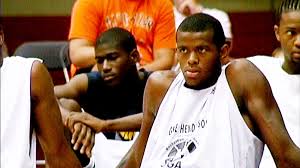Chances are you have never heard of Lenny Cooke. In 2001, Cooke was the number one ranked high school basketball player in America. He was ranked just ahead of fellow high school players and future NBA stars Lebron James and Carmelo Anthony. A new documentary, Lenny Cooke, chronicles Cooke’s journey from a young, cocky high school superstar to an older man who looks back at what “could have been.”
Early footage in Lenny Cooke shows Cooke as a good-hearted teenager from Brooklyn with ridiculous “ball playing” skills whose family moves to Virginia. Cooke, rather than go with his relatives, moves to a tony neighborhood in New Jersey and lives with the family of a former teammate (shades of the Sandra Bullock character in The Blind Side taking in Michael Oher). Cooke is many things: high school superstar, playground legend, and cocky. But by age 19, Cooke is not eligible to play high school basketball in New Jersey and apparently lacked the grades, the interest, and/or support system to apply to college. Therefore, Cooke mills around and eventually declares for the 2002 NBA draft but goes undrafted.
The film shows a disappointed Cooke playing in various European leagues, the CBA, and even the NBA summer league. However, he never catches on with an NBA team and toils in obscurity for years. For reasons unclear in the film (perhaps a combination of injuries and lack of interest and drive), Cooke is seen years later living in Virginia with his family and weighing 100 pounds more than he did during his playing days
Ironically, Cooke seems more at peace in the later footage. Despite being overweight and never having realized his dreams of becoming an NBA star, Cooke lives happily with his family. Cooke’s story is a sad, albeit not uncommon, tale of a young man who had amazing potential but never fully realized it.
In one poignant scene, Cooke is seen at Madison Square Garden watching a Knicks-Bulls game and meeting afterwards with Carmelo Anthony and fellow NBA star Joakim Noah (an Executive Producer on the film and a childhood friend of Cooke’s). The contrast between Anthony (wearing sunglasses after the game) chatting with an overweight Cooke is both stunning and sad, as years earlier they were playing against in each other as “equals” in high school tournaments.
The filmmakers use technology at the end of the documentary to show the present day Cooke talking side-by-side to the teenage Cooke which is also powerful.
The film instantly reminded me of another movie about a New York playground legend who never made it. Rebound: The Legend of Earl “The Goat” Manigualt starred Don Cheadle as Manigault, who played alongside Kareem Abdul-Jabbar and other future NBA stars, but never went pro, as he was seduced by parties, the wrong people around him, and drugs.
Lenny Cooke was directed by Josh and Benny Safdie and produced by Adam Shopkorn. One of the problems with the film is that it is disjointed and choppy in its storytelling. It begins with Shopkorn’s early footage of Cooke as a high school superstar. Shopkorn followed Cooke throughout the end of his high school career, with footage taken in Cooke’s home and at basketball camps, including a tournament with James and Anthony. Shopkorn sat on the footage and years later ran into the Safdies, who agreed to direct the documentary and tracked down Cooke. The gap in time between the early footage of a young, vibrant Cooke and today’s footage of Cooke makes the film a bit difficult to follow as the viewer is left to wonder what transpired in Cooke’s life between his failure to be drafted into the NBA and the later years in Virginia.
Despite those shortcomings, the film is entertaining and leaves the viewer wanting to learn more about Cooke’s trials and tribulations. If Cooke had different people advising him, could he still be playing alongside Lebron and Carmelo, this time in the professional ranks?
The documentary also notes that Cooke has been touring the country telling kids his story. If Cooke can use his experiences to help today’s teens avoid the pitfalls he could not, Lenny Cooke will have really “made it” – just not in any way that he could have predicted when he was a teenager.



Leave a Reply